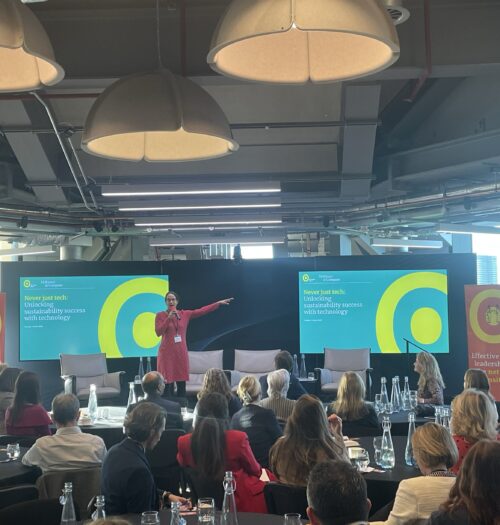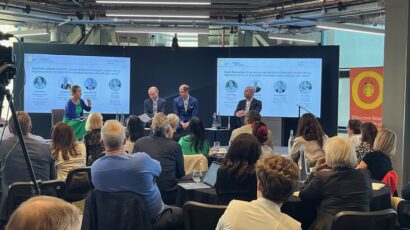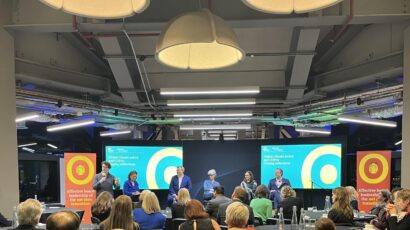
Never just tech: Unlocking sustainability success with technology
Climate change will not stop – in fact things will only get harder – but frontier technologies (such as AI) are at the centre of the solutions companies should be, and often are, harnessing to address not only growth but also the impact of climate change. The question for NEDs is how the companies on whose boards they sit should take advantage of these technologies. In other words, how do they go from discovery to adoption?
Here are some pointers:
1. What are the big trends and how can they work together?
We are in an AI revolution. Alongside that we continue to digitise. And we have the benefits of the next generation of computing (namely quantum computing), as well as cutting edge engineering to weave into being future-fit businesses. So how do we take these four advancements in technology to get to a sustainable world?
One tenet under which these four tech trends can work together to get us to a greener future is the reduction of cost. AI can be a big cost saver when it is used to optimise processes and decision-making. For example, AI can support offshore wind projects by using AI tools to determine how to lay out the turbines in the optimal way, to support construction optimisation, to predict lifetime costs and to understand turbine failure.
Digital tech is ultimately an enabler and an efficiency provider, but it must be harnessed in a business-first way – never as an end in its own right. NEDs who understand how AI can be useful to their businesses and can link that thinking to companies’ long-term strategies as well as green growth will make a significant difference.
2. Is sustainability and AI an oxymoron?
Not only is the deployment of AI tools about integrating tech – alongside sustainability – into business strategy, it’s also an exercise in the responsible use of energy to train large-language models (LLMs) as well manage data. Carbon production and water usage as a consequence of using AI tools and managing huge datasets cannot be ignored in board decision-making processes.
The energy-use consideration must be front of mind and could result, for example, in a decision by the company to share the impact of LLM training across a number of uses to spread the carbon cost of LLM development and be mindful of impact on the planet.
In recent months, we have seen the biggest tech companies becoming huge energy players. They are both signing nuclear energy contracts and buying up carbon credits as they seek ways to power operations which are ultimately a significant drain on energy resources.
We are also seeing some of the largest data centres now using renewable energy to run their operations. What is more, the planning of data centres, their location and how they manage waste are increasingly top of mind as the planet becomes a stakeholder in these decisions. There is clearly an impact mitigation strategy at play here…but it needs to go further.
That being said, many believe we cannot achieve an effective energy transition without applying AI tools because an AI-enabled transition leads to improved efficiency and productivity. It is very much a chicken and egg situation.
3. It’s about business strategy rather than AI strategy
NEDs would do well to ask their executive board members about the opportunities for AI use to enhance productivity and drive down cost. After all, AI is an operational tool when used properly and its use should result in action on both productivity and cost.
While data science, engineering and product management capability are all intrinsic to the modern, future-facing business, if their use is to be turned into action, there must be a culture of change within businesses, driven down from the board.
And while AI is not a strategy in its own right, part of business strategy should be about developing responsible AI principles and revisiting them regularly to update them based on new experience. There must be guardrails and, in the case of generative AI use, an understanding of intellectual property ownership around the underlying data.
Where AI tools are in use, there must also be human oversight, strategies must be put in place to avoid bias, privacy issues must be understood and the real-world impact on people of AI solutions should be part of the decision-making process. These are all concerns that are the domain of the board.
4. NEDs need to upskill to ask the right questions
The upshot is that NEDs must upskill to ask the right questions. There are ethical as well as legal and practical implications of AI use and boards need to be prepared with questions around guardrails and training policies if they are to play an effective role in the conversation.
But AI is a huge opportunity for companies to drive out cost and drive up efficiency. AI is also a competitive advantage for their businesses. That is why a positive, optimistic mindset should prevail.
So NEDS should be thinking about how to inspire the executive leadership team to adopt sustainable innovation. This means being prepared to drive technological innovation – for which you need the need right talent, culture, and change model.
Upskill through further reading:
- https://www.mckinsey.com/capabilities/mckinsey-digital/our-insights/cloud-powered-technologies-for-sustainability
- https://www.mckinsey.com/capabilities/sustainability/our-insights/sustainability-blog/never-just-tech-unlocking-sustainability-success-with-technology
- https://www.mckinsey.com/about-us/new-at-mckinsey-blog/catalyst-zero-helping-decarbonize-businesses


